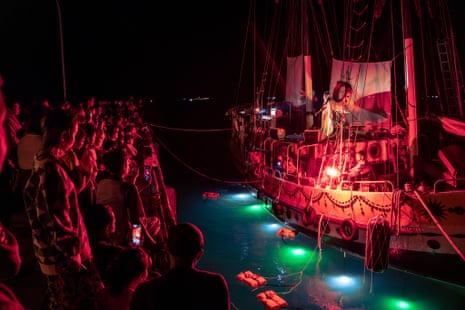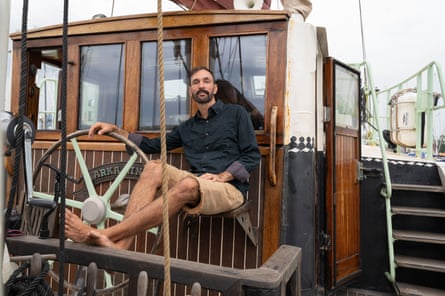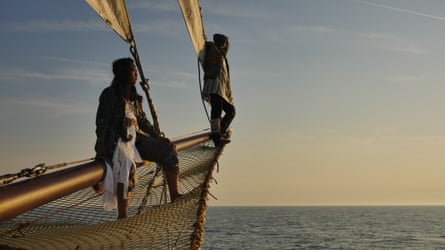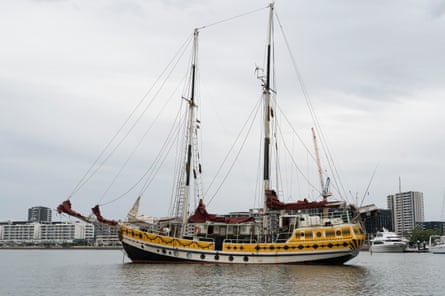There are so many famous stories of bands on tour: the Who being banned from every Holiday Inn in America; Led Zeppelin’s John Bonham riding a Harley through the Chateau Marmont. But how many musical acts can say they have circumnavigated the Earth twice by boat, on a tour that has lasted four continuous years, and reached some of the world’s most far-flung places – all without murdering each other?
“Everybody who comes aboard the Arka Kinari is bizarre,” says US musician Grey Filastine, one half of the husband-and-wife duo Filastine and Nova. “I mean, who is going to leave their life for months to make almost nothing and risk their life? It’s a self-selecting group of people.”
The Arka Kinari – a name formed from the Latin word for vessel, and a Sanskrit name for a half human, half bird musician that guards the tree of life – is a 70-tonne sailing ship that serves as a home, touring vessel, music venue and creative project for Filastine and Nova, who mix Javanese folk with psychedelic synths and percussion to spread the word about climate change. The boat also is their stage, replete with subwoofers, costumes, and sails that unfurl to screens during their performances.
And it is a declaration to the world’s musicians: it is possible to tour in an eco-friendly way.
The Arka Kinari’s ragtag crew – usually numbering between five and seven people recruited online – double as sound and lighting engineers on top of their daily duties: welding, carpentry, medic, cooking.
“We always manage to find a peace,” Filastine says of the months they spend living and working together at sea. “You may not get along, but you start laughing about how you don’t get along.”
Then he laughs. “And you don’t have anywhere else to go!”

Since 2019, the Arka Kinari has sailed about 50,000 nautical miles. Though Nova Ruth is descended from an Indonesian seafaring tribe, neither she or Filastine knew anything about sailing when they first set off.
“I didn’t know how to tie a knot, I didn’t know starboard from port – and four years later, I am the captain,” says Filastine. “Sometimes I think, ‘I shouldn’t be doing this.’ And on the other hand, 50,000 miles is more than most boat owners sail their whole lives.”
As musicians and activists, both were frustrated by the environmental impact of touring. A 2010 study found that three-quarters of greenhouse gas emissions produced by the music industry came from live performances; in 2009 it was estimated that U2’s world tour had the equivalent carbon footprint of a return flight to Mars. In the decade since, musicians including Harry Styles, the 1975 and Coldplay have attemped to mitigate the impact of their tours by introducing measures including tree-planting initiatives, using solar power for their stages and upcycling merch.
Filastine and Nova eventually found a method to match their message: they sold their share in a house in Seattle and borrowed money to buy the Arka Kinari, a battered old schooner that they refitted in Rotterdam. Ever since, they have sailed around the world, performing at festivals – including Sydney festival next week and Mona Foma in Tasmania in February – as well as stopping in at tiny fishing villages and seaside towns, where locals are invariably curious.
“Usually they ask us, ‘Why are you doing this? It must be so difficult.’ That’s when we bring up climate change – we ask them if they have been impacted by it. So often they will have stories,” says Filastine.

“I’ve watched this issue ebb and flow, become cool and uncool, since I was a teenager. But you just have to stick doggedly to the cause. Sometimes everyone thinks you’re Chicken Little. Sometimes everyone agrees with you.”
Does Filastine ever get frustrated that more touring acts don’t try to be more green? “Arka Kinari is a strange mix of practical and romantic,” he replies. “It’s meant to inspire – an almost impossible thing that is being done … But at what cost? A slowness that would drive many crazy. It’s very precarious, we’re just barely getting by. And a dependency on the whims of nature – the wind, currents and tides rule our lives in a way that most of us have completely forgotten.”
As an example, they have spent weeks bobbing along the east coast of Australia ahead of their first performance, in order to avoid Cyclone Jasper in December.
“We have to feed and look after a five-person crew in Australia for weeks before our shows even start,” Filastine says. “So no, we can’t demand that of other artists.
“Look, life is hard for a lot of people,” he continues. “Maybe they aren’t willing to take on the most difficult problem the human race has ever faced. Personally, I don’t think they should have to – none of us should. These are systemic problems that require massive levers of power to bring about the change we need.

“Not everyone has the option of dedicating 10 years of their life to finding a ship, outfitting it, finding a crew and changing their entire performance mode into something that sails. We can’t ask that of everyone. But we can say, ‘Look, if we did something this extreme, perhaps you can do something a little less extreme.’”
After four years at sea, Filastine has noticed changes in himself. “I have more time to be creative, to learn, swim, dive, think, to stare at the horizon – I’ve never had more time for that in my life. I read again! I didn’t for 10 years because there were always screens. And my music tastes have changed too – I’m listening to a lot of long-form classical pieces. It sounds weird, but putting on a three-minute pop song at sea makes no sense.”
And they’ve seen things most people will never get a chance to. When the pandemic hit, the Arka Kinari had nowhere to go, as most countries were only receiving their own citizens. After an emergency stop in Hawaii to load up with months of supplies, they set off west – not knowing where and when they would next step on land.
“It was very, very difficult – and a strange blessing,” says Filastine. “We had a third of the earth to ourselves.”

But when the world shut down, some previously closed-off places unexpectedly opened up. Needing repairs, the Arka Kinari docked at the abandoned Pacific atolls once used by the US to test nuclear and biological weapons, some of which had not been occupied by humans since they were evacuated in the 1950s. The ship radioed for permission to land, but there was no reply; a kind of tacit permission granted.
On shore, they found was a perfectly preserved time capsule. A church with all its windows blown out, a Bible still open to a moth-eaten page. In a school they read attendance records that dwindled as evacuation day approached: 100 students, then 80, 60, 20, four. The landscapes were utterly wild – and incredibly beautiful.
“Strangely, the atolls gave me hope,” Filastine says. “The healthiest ecosystem I had ever seen was on the edge of a nuclear testing site. All it takes is us to back off a little bit and nature can thrive.”

